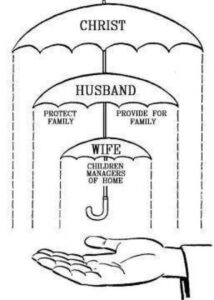Let Us Prey: A Ministry of Scandal was released just a few days ago, exposing decades of coverup and abuse in the Independent Fundamental Baptist movement. If you haven’t watched it, understand that it’s gritty, raw and tear jerking. For many, it will be shocking.
For me, it wasn’t.
I grew up IFB. Many of the pastors exposed in the documentary, like Lester Roloff and Jack Hyles, were praised and platformed at the small country church I attended. Roloff, who ran many abusive boarding schools for rebellious IFB children, was a personal hero of mine. As a young teenager, I wanted to name my firstborn son after him. When I first started finding out about the abuse in the IFB movement, I thought it was isolated incidents and didn’t want to believe it.

Shannon Makujina
Then it happened to me.
I sobbed watching Let Us Prey, memories of my own abuser haunting me. He fit the typical profile for an IFB predator: a leader in church ministry, much older than his victims and a groomer who had been playing the long game — for years. And sadly, his abuse was covered up by the church while I was forced to leave.
Why is abuse such a big problem in the IFB movement? Let’s go through a few of their core teachings that lend themselves to abuse. While not all these are found at every church, at least some of these teachings are present in most IFB churches. Keep in mind that IFB churches are “independent” and some of their churches are anomalies.
Authority structure
IFB culture is deeply patriarchal, and women are not allowed to be a part of church leadership. Men are the only leaders in the church and women are thought of as “weak” and “easily deceived,” needing to be “meek and quiet.” We were taught from a young age not to contradict a man in the church, no matter how wrong they were.
Many IFB churches follow an umbrella model of authority promoted by Bill Gothard. This model shows an authority structure that goes in the order of Jesus-Pastor-Men-Women-Children.
 In order to be safe, protected and discover God’s will, you need to stay under the umbrellas of authority over you. The pastor is the ultimate authority under God and the one who reveals God’s will for you and passes down instructions from God, since he is the one directly under God. (Not all churches would explicitly reference Gothard, but his teachings on authority and contributions to purity culture have an overwhelming influence on IFB churches regardless of whether his name is mentioned).
In order to be safe, protected and discover God’s will, you need to stay under the umbrellas of authority over you. The pastor is the ultimate authority under God and the one who reveals God’s will for you and passes down instructions from God, since he is the one directly under God. (Not all churches would explicitly reference Gothard, but his teachings on authority and contributions to purity culture have an overwhelming influence on IFB churches regardless of whether his name is mentioned).
IFB has a culture surrounding pastors and ministry leaders that is nothing short of cultish. The pastor is referred to as “God’s man” or “the man of God.” Church members are told they need to submit to the man of God and avoid making him angry, lest God’s judgment fall on them. Pastors are idolized and can do no wrong.
That makes them perfect predator material and also makes it hard for victims to get justice, as the pastor has ultimate say over reporting abuse allegations to the police. If victims do try to report crimes, they can be shunned by the church and excommunicated. These churches protect the “men of God” while throwing the women and children they preyed on under the bus.
Purity culture
IFB is notorious for the way women dress — long skirts, high-collared blouses and very little makeup or jewelry. But there is something far more sinister beneath the innocent appearance. “Purity culture” is the word many ex-IFBs use to refer to the culture of modesty, strict rules of courtship and emphasis on premarital purity. While these may sound like wholesome things, they set the stage for abuse in the church and in the home.
Modesty is strongly emphasized in IFB, particularly for women. Women are not allowed to wear pants, with some rare exceptions for culottes. All dresses must be loose fitting, and skirts are expected to be long, with some churches requiring stockings. Women are not allowed to show their upper arms, shoulders or any of their legs.
“The idea behind these strict standards is that women are responsible for preventing men lusting after them.”
The idea behind these strict standards is that women are responsible for preventing men lusting after them. This leads to objectification of women’s bodies, even at a very young age. Women who don’t meet these strict standards are shamed for tempting men. Self-control for men is rarely talked about, and the brunt of preventing sin falls on women dressing modestly.
Sadly, these outrageous standards only worsen the problem, by hyper-sexualizing everything about women and viewing them as “temptresses” who need to be protected and covered by their male authority figures. For many victims of abuse, the church is more concerned with shaming them for what they were wearing at the time of assault then getting justice for the violence committed against them. (Modesty standards vary from church to church, but the legalistic attitude that objectifies women’s bodies does not).
IFB places a huge emphasis on premarital purity and tries to ensure this by strict rules for courtship and denying IFB children sex education.
The women in Let Us Prey all share a common denominator in having received little to no sex education when they were assaulted. As a result, they did not realize what was happening.
Sadly, this is the norm in IFB and something I personally experienced. Sex education was considered ungodly government propaganda, and it was normal for women who were engaged to only be given the “talk” shortly before their wedding. Courting was practiced, where the parents and pastor of a couple set them up and chaperones are present through the duration of their engagement. No physical touch is allowed.
This also stems from the idea that women are inherently a danger to men and men are unable to control themselves. There were several books the IFB handed out to couples-to-be, all of which taught toxic and unbiblical teachings about marriage and sex. These books taught women it was a sin to deny their husband sex for any reason and that they were responsible for keeping their husband from being attracted to other women and girls.
These unbiblical messages, combined with the patriarchal teachings on male authority, lead to much domestic abuse.
If you have no sex education, you have no teaching on consent. Consent is considered a “secular” concept and is not taught. The idea is that good IFB teens will remain pure until marriage and once married, they have given a blanket consent for everything ever after. As mentioned above, these kinds of messages foster a culture in which marital rape and obligation sex are common.
But they also do something else harmful. Since men are not taught to “ask” and women are not taught they can say “no,” girls being groomed have no idea they could choose not to consent to the actions of their abusers. Since these predators are often authority figures, saying “no” or expressing discomfort is even more out of the question.
“Growing up IFB, I was under the impression Jesus died for my virginity, not my purity.”
Growing up IFB, I was under the impression Jesus died for my virginity, not my purity. Pastors would use illustrations such as a half-eaten popsicle and offer it to parishioners. When they refused, the man of God would explain that was what a woman who had lost her virginity was like — an unwrapped, disgusting popsicle. Licked chocolate bars and roses with the petals pulled off were other examples of such illustrations.
Messages like these terrified young IFB women into submission and shamed those who already had “sinned.” Women who were abused were viewed as dirty and unchaste and sometimes considered ineligible for marriage. This made it even harder for victims to come forward since they didn’t want to face the shame sure to fall on them. Rather than being seen as victims of abuse, they were viewed as harlots who lured the pastor away.
Purity culture sounds very innocent but leads its followers away from the gospel and away from the biblical teachings on sex, marriage and self-control. Purity culture is predator culture and is responsible for damaging so many — both women and men.
Separation from the world/martyr complex
One of the most distinctive teachings of IFB is that they are set apart from the rest of the world to be unique. This requires them to distance themselves even from other evangelical churches. It also causes them to respond to accusations against IFB leadership as persecution from Satan and “the world.”
The desire to be “set apart” from the rest of the world is what fuels many bizarre IFB practices but is one of the primary reasons many IFB children’s homes refuse to get a state license. This would involve placing themselves under government authority rather than the pastor’s authority, something incomprehensible.
This also is common for IFB colleges and schools, with many of them rejecting accreditation because they want to remain “separate” from the government. In an ideal IFB world, everything is under the oversight of the man of God, who runs his church much like his own little kingdom.
 The police are an unwelcome nuisance, usurping the authority of a pastor in his church. Many IFB pastors have a hostile attitude toward reporting abuse to the police because they believe abuse is a church matter to be kept “in house.” The idea of mandated reporting or needing a license to run a children’s home is seen as a muddling the division between church and state.
The police are an unwelcome nuisance, usurping the authority of a pastor in his church. Many IFB pastors have a hostile attitude toward reporting abuse to the police because they believe abuse is a church matter to be kept “in house.” The idea of mandated reporting or needing a license to run a children’s home is seen as a muddling the division between church and state.
Reporting abuse could make the church or pastor look bad. Of course, this could not be since the pastor had done nothing wrong — it was a result of persecution from God’s enemies.
“From a young age, we were taught we were different and the world hated us for that.”
From a young age, we were taught we were different and the world hated us for that. Hence, anyone who opposed the pastor or authority structure was defying God himself.
IFB pastors compare themselves to prophets in the Old Testament, threatening God’s vengeance on anyone who stands in their way. Sadly, I heard many times, “Even if they did do something wrong, it’s not your place to talk about it.”
Just last week, I had a concerned individual tell me God’s wrath would come on me if I continued to speak against church abuse. This mindset is prevalent and combined with a martyr complex, it fuels the coverup present in so many IFB churches.
It is the responsibility of the IFB church members to protect their church from persecution and prying government eyes that might feel differently about the pastor-ruled theocracy.
IFB is full of toxic unbiblical teachings, but hopefully this article will familiarize you with some of the IFB doctrines that cause their churches to be a cesspool for abuse. Sadly, by the time I got out, I already had fallen prey to a church leader who had been grooming me for years. You can read some of that story here.
The IFB cult has harmed so many people and been a conduit for so much abuse. It continues today. You probably have one, if not several, IFB churches in your town, especially if you live in the American South. Looking at the whitewashed exteriors and the happy, smiling mega-families with their Bibles and violins, not many would guess at what really goes on inside the church building.
For me, and many others who survived, it’s not a guessing game.
Shannon Makujina is a 19-year-old blogger in the upstate of South Carolina, excitedly sharing her journey from legalism to the grace of God. Shannon writes about church abuse, religious trauma and pursuing a relationship with Jesus after growing up in fundamentalism. Find her work at shannonmakujina.org.
Related articles:
The horror of Let Us Prey may not be as far from home as you think | Analysis by Rick Pidcock


